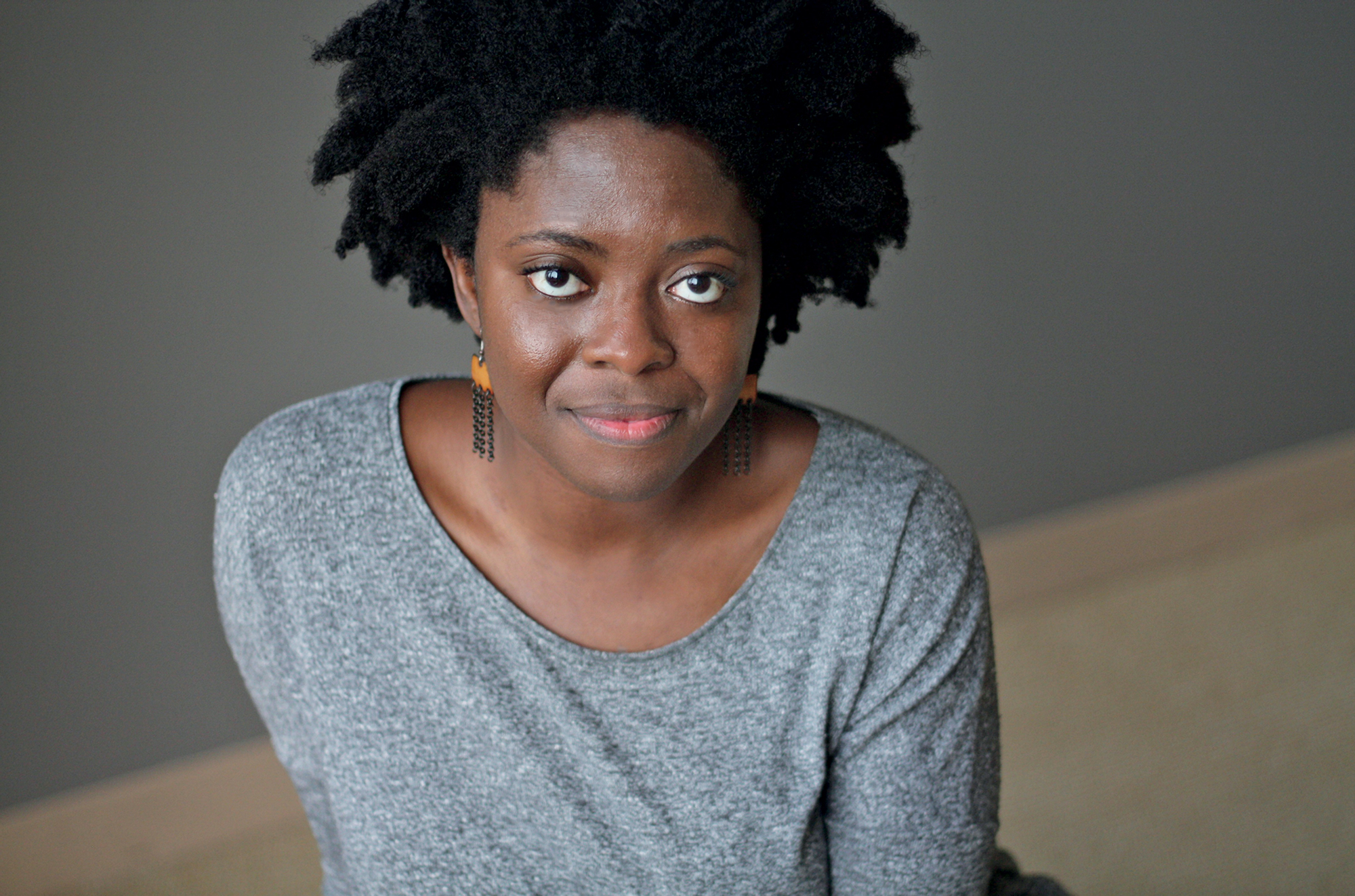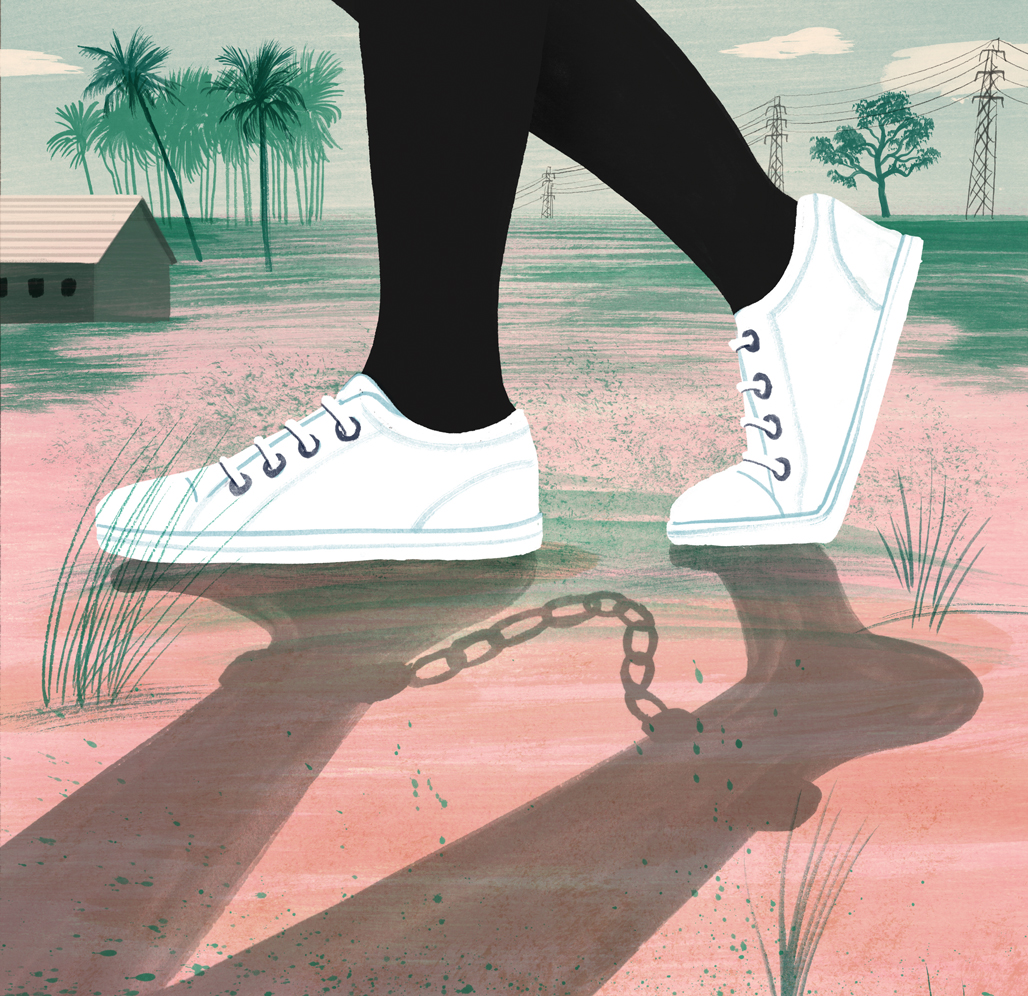For a moment, Yaa Gyasi’s return to Ghana the summer after her sophomore year at Stanford seemed destined to be a disappointment.
She’d made the trip to the country she’d left as a toddler to do research for a first novel centered on a mother and daughter. But her time in the Central Region where Gyasi’s mother had grown up hadn’t revealed much to base a book on. And she was facing the prospect of leaving with little to show for her efforts and ambition, or for the Stanford grant funding them.
“I was kind of feeling as though I had wasted everybody’s time and money and confidence,” she says.
Then a friend’s visit prompted a detour some 50 miles away to the Cape Coast Castle, an old British slave fort, where the inspiration that had been so elusive would suddenly blossom. Expecting solemnity but few surprises, Gyasi, ’11, was fascinated to learn British soldiers sometimes married local women, who lived in ease in the castle’s upper levels.
 SUCCESS STORY: Gyasi has been touched by readers’ responses to Homegoing. (Photo: Michael Lionstar)
SUCCESS STORY: Gyasi has been touched by readers’ responses to Homegoing. (Photo: Michael Lionstar)
The realization only made it more jarring to descend into the fort’s still-rank dungeons, the suffocating, near lightless last stop for millions of captives before they passed through the “door of no return” and endured the horrors of the Middle Passage.
Buffeted by images of such wildly disparate fates unfolding floors apart, Gyasi’s mind began racing with ideas for a far more ambitious book than the one she’d been working on. In her journal that night, she wrote that she was scared of how much research lay ahead.
Indeed, the ensuing book would take seven years to publish. At one point, she cast away three years of writing to start again. But the result, Homegoing, has made Gyasi one of America’s most celebrated young authors, one draped with awards like the National Book Critics Circle’s prize for best debut novel. This summer, Homegoing is one of three books assigned to all incoming Stanford freshmen.
Taking place over two and a half centuries, the book traces the descendants of Effia and Esi, half-sisters from different tribes and villages, whose lives and lineages are forever changed by the castle and its cruelties.
One is married off to the castle’s governor, her son sent for education in England, before the taint of slavery brings the family low. The other endures the dungeon below her sister’s feet only to be stolen away to the sadism of a Southern plantation. Gyasi follows seven generations to the present day, and to Stanford.
“It’s impossible not to admire the ambition and scope of ‘Homegoing,’” Michiko Kakutani wrote in the New York Times after the book’s release in June 2016. “[T]hanks to Ms. Gyasi’s instinctive storytelling gifts, the book leaves the reader with a visceral understanding of both the savage realities of slavery and the emotional damage that is handed down, over the centuries, from mothers to daughters, fathers to sons.”
Hype for the book actually began months earlier, stoked by rumors of its seven-figure sale price and by early champions like journalist Ta-Nehisi Coates. In his own moment of glory after winning the National Book Award for Between the World and Me, Coates took to Twitter with repeated praise. “Finished Yaa Gyasi’s ‘Homegoing’ yesterday,” he wrote in one tweet. “Thought it was a monster when I started. Felt it was a monster when I was done.”
It was a surreal moment for Gyasi — who had been reading Coates’s work in the Atlantic since her Stanford days and hadn’t even known Coates had a copy — and a sign of the rush of attention and publicity to come.
With little letup, she has been touring since before the book’s release, she said while on a recent trip to the Bay Area bookended by appearances at Google headquarters and an onstage Q&A in San Francisco in front of nearly 1,000 people. Days later she was the focus of a feature in T, the New York Times style magazine.
 BOOK TALK: Gyasi with Trevor Noah on The Daily Show. (Photo: Comedy Central)
BOOK TALK: Gyasi with Trevor Noah on The Daily Show. (Photo: Comedy Central)
She laughs at a question about whether fame and fortune have sprung her into the life of an A-lister. Yes, she moved from Berkeley to New York, but that was motivated by wanting to be closer to her boyfriend’s family and reduce travel to her publisher, not because she anticipated regular gigs on The Tonight Show. Her hobbies and habits remain distinctly homey — reading or watching TV. She is not getting stopped on the street.
Success has given her a chance to share her love for other artists. She wrote a piece for the Times extolling comedian Issa Rae, ’07, but she would hardly compare the value of her endorsement of Rae to the boost Coates gave her. She’s not sure Rae even knows she wrote it.
Still, for a 28-year-old whose preferred work is at a desk writing alone, the spotlight has been bright, even for someone used to performing. Gyasi’s talent and commitment were evident from the start, recalls Stanford creative writing instructor and author Molly Antopol. “She was incredibly dedicated and really understood the work it takes to write a book.” But Gyasi also engaged a broader love of language that encompassed theater, poetry, a cappella and spoken word.
She says she’s shy and subject to occasional moments of inner terror, especially before TV interviews. Yet she carries herself with quiet comfort in front of crowds, be they the millions watching The Daily Show or the hundreds at local events. Even as she’s probed on the book’s thorny themes — from African complicity in slavery to racism in America today — she speaks with thoughtful but surefooted precision.
And she’s touched to see how Homegoing affects people. From the beginning, her aim was to write more than an entertainment. On her blank screen, as she started the book, she spelled out a guiding query: “What does it mean to be Black in America today?” and the book is an illustration that the answer to her is so much in the past, including in Africa.
In Homegoing’s final chapter, a Stanford doctoral student named Marcus, the distant descendant of the sister sold into slavery, struggles to resume his research. He’d intended to focus on convict leasing, a de facto perpetuation of slavery after the Civil War, which had claimed his great-grandfather. But he finds it impossible to isolate one era without delving into everything that comes as a consequence — from the Great Migration north to escape Jim Crow to the racially targeted War on Drugs.
It’s a scene that reflects both Gyasi’s occasional struggles with the amount of research she had to do and her belief threaded through the book that the dominoes loosed by slavery, colonialism and two centuries of institutionalized racism have been falling ever since. In Homegoing, she wants readers to see “these things came from those things which came from those things.
“That through line I think was the most important part of this book for me,” she says. “The present is not separate from history; it is a part of history.”
She opted not to research her own family history for the book, preferring the freedom of imagination. But her family life was central to her evolution as a writer. When she was 2, they left Africa so her father could pursue graduate studies at Ohio State. Then came stops in Illinois and Tennessee as he climbed the academic ladder.
By the time the family settled in northern Alabama — where her dad joined the French department of the University of Alabama in Huntsville — Gyasi had lived in two countries and four states in her nearly 10 years.
Amid the blur of change, the public library was a constant for Gyasi and her two brothers, a natural focus for a family with a literary bent and limited means. And for Gyasi, books became the friends that stayed friends no matter how often she moved. “Even watching TV she had a book,” her father, Kwaku, says. “You could not see her without a book.”
Writing grew naturally from that love. At 7, she wrote her first short story. Her parents had just vetoed a request for a puppy, but in “Just Me and My Dog,” Gyasi imagined the outcome she wanted. After typing it up with her dad, they mailed it to a contest run by her favorite TV show, Reading Rainbow.
In response came one of the treasures of her youth — a certificate signed by the show’s host, actor LeVar Burton (who famously portrayed a slave character, Kunta Kinte, in the 1970s TV miniseries Roots). The paper hung above her bed for the rest of her childhood. “I am pretty sure it’s probably in her room in New York right now,” her father says.
As she grew older, her taste in books and stories ranged from young adult fiction to an abiding love for Victorian greats like Dickens and George Eliot. Middlemarch was a special favorite. “It feels like reading a Victorian gossip rag.” In general, there were lots of frustrated romances, she says. And lots of white people.
But when she was 17, she found a book that would touch her more deeply than anything before it — Toni Morrison’s Song of Solomon. It was the first time Gyasi had ever been assigned a book by a Black woman. And the blackness of the book, from the characters to the author, turned on a light — this was a path she too could follow.
“Even the stories I was writing at that point had mostly white protagonists,” she says. “I don’t think I really understood that there was a space for people who looked like me in the world of literature until I started reading Toni Morrison.”
It was then she began telling people she wanted to be a writer. When it came time for college, the question was already settled. Gyasi was resolute in studying English, even as her parents pushed for something more likely to lead to medical school. (Gyasi is not easily moved from what she wants to do — the first agents to express interest in an unfinished version of Homegoing wanted changes. She declined.)
The summer before coming to Stanford, she addressed race for the first time in a story inspired by her high school job working as a waiter at an Alabama senior home, tending a generation of aging Southern whites who sometimes didn’t know what to make of her.
She remembers one woman, learning her father was a professor, saying: “Imagine that, a Black man teaching.”
In fact, her family’s ethnic identity was always more complex than skin color. Foremost they were Ghanaian and West African. After each move, her father would open the phone books to look for Ghanaian-sounding names to call and greet, she says.
They did not at first see themselves as Black, even as society clearly did. If she came home and told her parents about another student using a racial epithet to her, they’d be confused why it was even applied. For Gyasi, like many young immigrants, a weird displacement developed. She grew up feeling not Ghanaian enough to be Ghanaian and not African American enough to be African American.
It was only at Stanford that she first heard the word “diaspora” — a word big enough to include her full experience. And a word at the heart of Homegoing, whose title comes from a slave belief that in death the displaced could return to wherever they had been stolen from.
In some ways the book is an effort to restore a family heritage ripped apart long ago. One of the unexpected, and touching, responses she’s received from African American readers is that the book prompted them to get DNA genealogical testing to get a sense of what is otherwise impossible to know — where they come from.
Moreover, Gyasi’s resonant writing has fans eagerly awaiting her next book. But they will have to wait a bit. The success of Homegoing has interrupted the young author’s routine. Prior to its release, she had started a second novel, but it’s largely been set aside for now. Like the books of her childhood, it’ll be there when she stops all this moving.
Sam Scott is a senior writer at Stanford.



